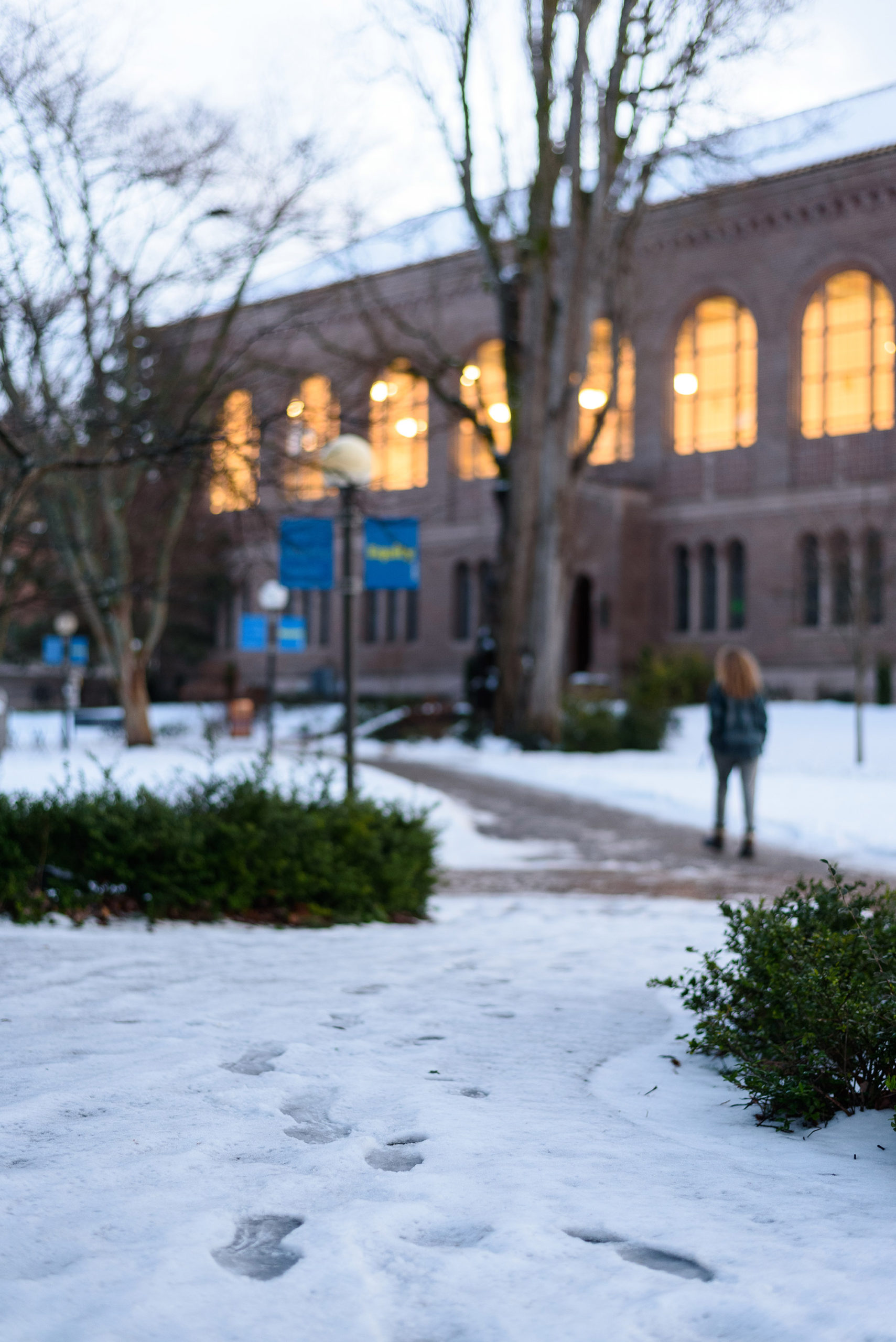Footprints in the snow highlight an uncleared path on campus. Joe Addison // AS Review
By MacKenzie Dexter
I know what you’re thinking, another article about the snowy, cold weather. Western cancelled classes for nearly a week due to inclement weather, during the week of Jan. 13 though Jan. 17. With the long break, there was a lot of time to think about the snow and how the community, businesses and schools reacted to it. As a fourth-year student, one aspect of winter at Western remains the same: an icy and inaccessible campus.
It’s frustrating for anyone to navigate icy pathways without falling on one’s way to class. However, I am fortunate that I am able to successfully get to my classes. I know that I have peers who are unable to come to campus because of the lack of clear pathways.
This year, dozens of students collaborated in writing a letter to the Western administration, voicing their concerns and frustrations about the lack of shoveling and safety concerns on campus. Luke LeClair, student and Disability Outreach Advocacy Coordinator, made a post on Facebook and Reddit with the letter addressing their concerns.
Part of the letter includes, “We as disabled students and allies demand that Western agree to not open until all campus buildings have a clear and accessible path and entrance. We ask that WWU put significant effort towards informing students of their right to remain home during inclement weather for their own safety.”
LeClair said that while this was the first time they sent a letter concerning campus safety hazards due to snow, it was not the first time they brought up concerns about campus safety and accessibility. LeClair also addressed the request in the letter that stated faculty should be required to attend training that would educate them on working with students with disabilities.
“Trainings would cover all of their [professors] legal responsibilities when it comes to working with disabled students at a bare minimum, and hopefully go beyond that,” LeClair said.
LeClair said professors are required by law to provide equal and fair environments and “reasonable accommodations” for students with disabilities. However, LeClair said that they don’t believe some understand what constitutes “reasonable accommodations.”
“I don’t believe this is really their [professors] fault though, it should be up to the university to ensure that they know all of the necessary information to perform their jobs,” LeClair said.
LeClair shared their experience being stuck in the snow after having to attend a midterm that their professor didn’t move to another date. LeClair ended up being caught in the snow for almost half an hour before someone helped them home. Even after LeClair got out of the snow, it took another hour for them to get home. A couple of LeClair’s right-hand fingers lost feeling for the next couple of weeks and some still have not regained full feeling.
“Those couple of hours I was outside were terrible, and I don’t ever want someone else to have to go through that because of an obviously negligent system of policies,” LeClair said.
Tweets by fellow students took over my social media feed discussing the conditions before I even got to campus. While some people, including myself, are lucky enough to have gear that gives them an advantage while trudging through snow and ice, not everyone does. That makes attending school difficult and dangerous for those who do not have the resources.
Bee Fenner, a sophomore at Western, attended class on Jan. 14 and struggled to get to their on-campus meetings due to the unplowed paths.
“one of wwu’s only accessible routes is covered in ice if accessibility is a barrier for attendance, disabled students will be left behind. make an effort @WWU,” Fenner said in a tweet.
Fenner also talked to the AS Review about their personal experience trying to get to class when there is a lack of accessibility.
“I use a cane regularly, and access to the few accessible paths on campus is a necessity that was not available” Fenner said. “If campus is open during inclement weather, it must be open to everyone.”
While articles stating the obvious may go unnoticed later on, frustrations and concerns deserve to be heard. Students deserve to be able to access campus and their classes. Since I started at Western in 2016, it has snowed every year and students continue to be met with the same issues. While the weather may not be icy for long, it is consistent enough that the university should prepare for it.
“Neglecting the upkeep of accessible routes will keep disabled students from attending class, and is inherently a discriminatory practice,” Fenner said.

